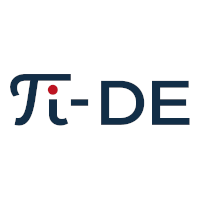Focus Areas & Doctoral Projects
Focus Area A - Molecular Building Blocks
Focus area A addresses the synthesis of pi-conjugated molecular building blocks (MBB) with varying templating capabilities. In TIDE, the rationale for the selection of the materials used for templating is guided by the necessity to use (semi-)rigid, anisotropic MBBs to reduce their degrees of freedom in conformation, having in mind the naïve concept of building a brick wall. At the same time, the molecules should provide the desired optoelectronic functionalities, e.g. absorption and/or emission in the solid state (thin film).
Doctoral Projects:
A1.1 – Prof. Arne Lützen: Synthesis of squaraines with tailored supramolecular interaction and absorption properties
A1.2 – Prof. Arne Lützen: Synthesis and supramolecular organisation of chiral pi-conjugated small molecules
A2.1 – Prof. Sigurd Höger: Controlled formation of molecular stacks
A2.2 – Prof. Sigurd Höger: Scanning tunnelling microscopy investigation of polygonal arylene-alkynylene macrocycles that pre-organize attached polyaromatic hydrocarbon groups
A3.2 – Prof. Stephanie Kath-Schorr: Helical Orientation of π-Systems using Xeno Nucleic Acid Template Structures
Focus Area B - Functional Templates
Focus Area B deals with the synthesis of 2D and 3D templates, which shall enable ordered growth of molecules on top. We propose to use graphene, hBN and graphene nanoribbons as 2D templating substrates. Due to their ultrathin nature, transport or tunneling of charge carriers across the templates is possible, making them ideal candidates for our purpose of investigating molecular templating in OE devices (see Focus Area D). On the other hand, we will use artificial DNA-strands for 3D templating. Molecular Building Blocks will be obtained from Focus Area A and their template deposition be investigated in Focus Area B.
Doctoral Projects:
B1.1 – Prof. Klaus Meerholz: Graphene nanoribbons and nanographenes as groundfloor for templated growth of molecular building blocks
B1.2 – Prof. Klaus Meerholz: Improving the anisotropy of graphene nanoribbons (GNR)
B2.1 – Prof. Alex Grüneis: Electronic and transport properties in graphene nanoribbons as templates for ordered molecular adsorption
B3.1 – Prof. Sanjay Mathur: From mechanistic investigations on hBN growth to uniform mono- and multilayers on centimeter scale
B4.2 – Prof. Annika Kurzmann: Electronic and transport properties in bilayer graphene as template for ordered molecular adsorption
Focus Area C - Surfaces & Interfaces
In TIDE, the Focus Area C concerns the detailed study of the templated growth of MBB synthesized in Focus Area A onto the templates prepared in Focus Area B. In addition, we will use highly-oriented pyrolytic graphite (HOPG) as low-cost model for graphene. The structure and order in molecular thin films will be investigated using the synergistic set of experimental tools available from the Principle Investigators' laboratories.
Doctoral Projects:
C1.1 – Prof. Moritz Sokolowski: Electronic coupling in template controlled layers of pi-conjugated molecules
C1.2 – Prof. Moritz Sokolowski: Organisation of pi-conjugated molecules in linear chains
C2.1 – Prof. Klas Lindfors: Probing molecular order using plasmonics arrays
C2.2 – Prof. Klas Lindfors: Interaction of ordered excitonic matter with metasurfaces
C3.1 – PD Dr. Selina Olthof: Electronic structure of templated thin films
C3.2 – PD Selina Olthof: Controlling the electronic structure of organic semiconductors via controlled packing and growth
Focus Area D - Transport & Function
Focus Area D investigates charge and exciton transport in functional (pre-)devices. Optoelectronic devices are powerful analytical tools for measuring the macroscopic transport parameters in templated molecular layers. Influencing the order of molecular building blocks will allow us to obtain a further understanding of the underlying transport mechanisms and the optimization of device properties. Therefore, our focus is on investigating the impact of molecular order (amorphous vs. crystalline) on the intrinsic transport properties as well as on the eventual device functionality.
Doctoral Projects:
D1.1 – Prof. Paul van Loosdrecht: Ultrafast exciton and charge dynamics in ordered organic semiconductor systems
D1.2 – Prof. Paul van Loosdrecht: Ultrafast exciton and charge dynamics in ordered organic semiconductor systems
D2.1 – Prof. Klaus Meerholz: Lateral and vertical charge-transport study in templated molecular layers
D2.2 – Prof. Klaus Meerholz: Optoelectronic Devices with polarized emission and absorption
D3.1 – Prof. Malte Gather: Orientation, outcoupling and emission shaping in templated molecular layers
D3.2 – Prof. Malte Gather: Templating, ordering and strong light-matter coupling for polarization control
Focus Area E - Theory & Modeling
Focus Area E addresses method development and its application to templating. Theoretical approaches play an important role for the molecular design of organic electronic devices. Considering the scope of TIDE, we have distinguished three areas. In Templating process, we start with the clean surface of the template, followed by a subsequent filling of this surface with Molecular Building Blocks. In Bulk properties, we address thin-film properties related to variations in the nano-morphology, taking into account the possible dimerization of pi-conjugated molecules, and the formation of H- or J-aggregates. In Charge carrier and energy transfer dynamics, we want to compute steady-state charge and excitonic transport as a function of the order parameter.
Doctoral Projects:
E1.1 – Prof. Stefan Grimme: Development of efficient computational methods for the modeling of molecular adsorbates on graphene and graphene nanoribbons
E1.2 – Prof. Stefan Grimme: Designing interfaces by templating: modeling epitaxially growth with a modified general force field
E2.1 – Prof. Thomas Bredow: Electronic properties of adsorbate arrays of pi-conjugated molecules on hexagonal boron nitride
E2.2 – Prof. Thomas Bredow: Optical spectra and electronic structure of adsorbed pi-conjugated molecules
E3.1 – Prof. Stefan Grimme: Modeling steady-state charge and exciton transport in molecular clusters, crystals, and templated interfaces
E3.2 – Dr. Andreas Hansen: Modelling disorder effects into ordered structures
